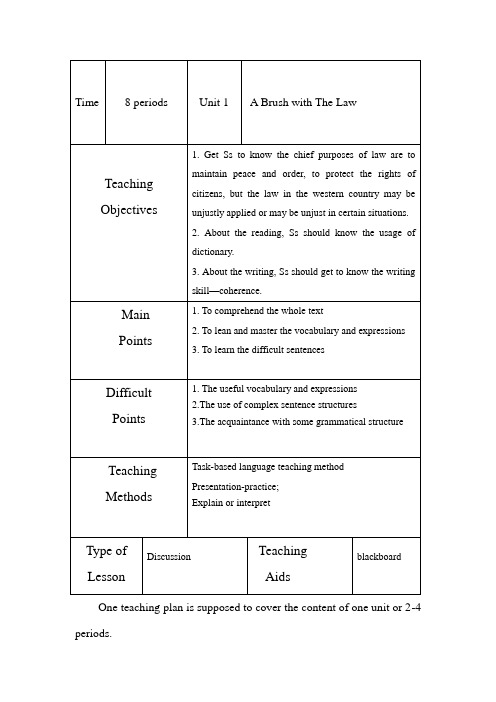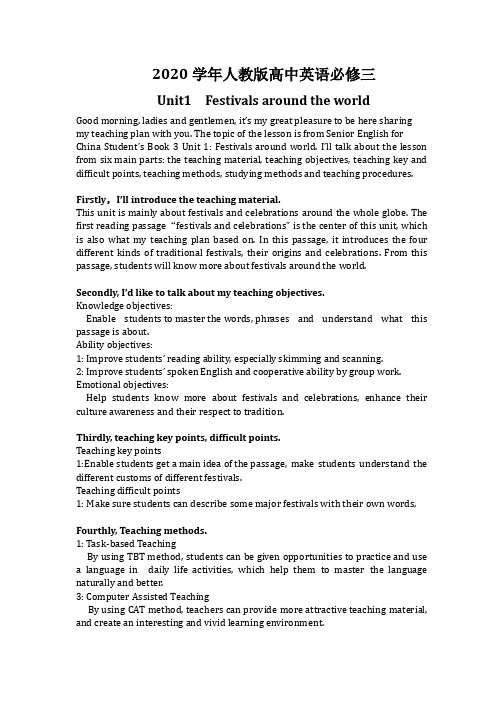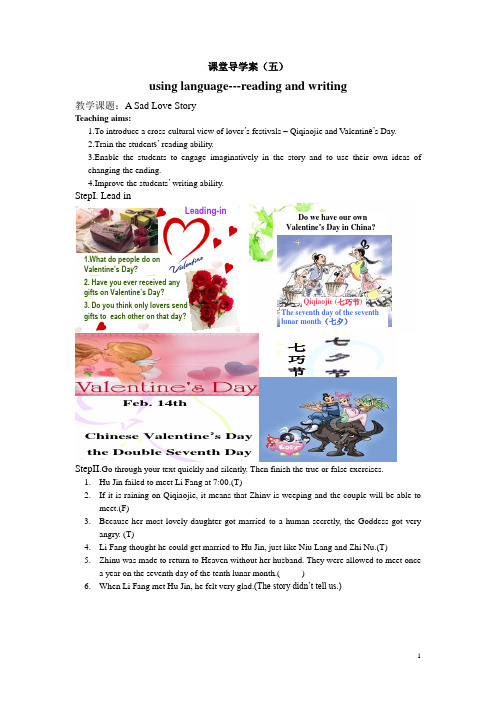book_3_unit_1_reading
新标准大学英语综合教程(第二版)Book3-Unit1课后答案

Unit 1Active Reading (1)4 1b 2 c 3c 4d 5c 6a51.attendance2.ambitious3.productive4.resistance5.script6.acceptance61 mortgage 2deck 3surf 4coastal; defy 5clamped 6criticized 7hauled 8prededing7 1b 2a 3b 4b 5b 6b 7a 8b 9bActive Reading (2)2。
1 c 2d 3b3 341 elapsed; cemetery2 rear; crammed 3triple 4budding;biography5finite 6dwellers 7invest 8skip 9inevitable51a 2b 3a 4a 5a 6b 7a 8a61a 2b 3b 4a 5a 6b 7b 8b 9aLanguage in use1·I’ve double- nd triple-checked it。
(compound verb)·budding crypt-kickers ((compound noun)·a rear-view mirror ((compound adjective)·the once-a-year holiday to Florida or Spain (compound adjective) ·back—burner stuff (compound adjective)·standing at the corner of the Co-op (compound noun)·a sepia—colored relative that no one can put a name to (compound adjective)21 a late-night party2 a well-stocked library3 a world-famous professor4 some well-timed advice5 a rapidly-growing population6 a free-market economy7 a half-hour boat trip31 It's how we behave that determines what other people think of us.2 It's what our character is that usually determines what sort of job we are going to end up doing。
新视野大学英语(第三版)读写教程Book3-Unit1-Section A-Never, ever give up!

Section A Never, ever give up!
Project of the unit Inspiring your thoughts Enhancing your skills Presenting your project
3
Project of the unit
Project forecasting
Inspiring your thoughts
Global understanding
Inspiring your thoughts
Task 1 Global understanding of the introduction
Read Paras. 1-2 and answer the following questions. • What is the main idea of this part? It introduces the theme question of the text: What is the secret of success? Whose example is used to elicit the idea? The example of Winston Churchill.
•
Inspiring your thoughts
Task 2 Global understanding of the body (Paras. 3-7)
Step 1 Read Paras.3-7 and find out who are cited as examples to illustrate the secret of success. Work in groups of four. Present your answers to the other group members. Discuss what traits these people have in common to be successful.
大学英语教案Book3-lesson 1

e.g. These freshmen once had a brush with the Customs man.
arbitrary:adj. decided by or based on personal opinion only rather than on reason
1. How did the author feel about the incident at the time it occurred? What does he think of it now?
2. What does“it”refer to?
The unpleasant experience.
4)Lawyer – Solicitor – Barrister
II:Warm-up questions and introductory remarks
1) Are you more suspicious of some strangers than others? What influences you when judging whether a stranger can be trusted?
IV:Part Division of the Text
Parts
Lines
Main ideas
1
1-4
The narrator has been in trouble with the law, which was rather a unpleasant experience.
2
5-66
The narrator was arbitrary arrested and released.
2020年人教版高中英语必修三unit1reading 说课稿

2020学年人教版高中英语必修三Unit1 Festivals around the worldGood morning, ladies and gentlemen, it’s my great pleasure to be here sharing my teaching plan with you. The topic of the lesson is from Senior English for China Student’s Book 3 Unit 1: Festivals around world. I’ll talk about the lesson from six main parts: the teaching material, teaching objectives, teaching key and difficult points, teaching methods, studying methods and teaching procedures. Firstly,I’ll introduce the teaching material.This unit is mainly about festivals and celebrations around the whole globe. The first reading passage“festivals and celebrations” is the center of this unit, which is also what my teaching plan based on. In this passage, it introduces the four different kinds of traditional festivals, their origins and celebrations. From this passage, students will know more about festivals around the world. Secondly, I’d like to talk about my teaching objectives.Knowledge objectives:Enable students to master the words, phrases and understand what this passage is about.Ability objectives:1: Improve students’ reading ability, especially skimming and scanning.2: Improve students’ spoken English and cooperative ability by group work. Emotional objectives:Help students know more about festivals and celebrations, enhance their culture awareness and their respect to tradition.Thirdly, teaching key points, difficult points.Teaching key points1:Enable students get a main idea of the passage, make students understand the different customs of different festivals.Teaching difficult points1: Make sure students can describe some major festivals with their own words, Fourthly, Teaching methods.1: Task-based TeachingBy using TBT method, students can be given opportunities to practice and use a language in daily life activities, which help them to master the language naturally and better.3: Computer Assisted TeachingBy using CAT method, teachers can provide more attractive teaching material, and create an interesting and vivid learning environment.Fifthly, studying methods.1: Task-based learning.2: Cooperative learningSixthly, Teaching procedures.1: Lead-inShow students a short video some traditional festivals’ celebrations. After watching that, ask students questions like “have you ever had these festivals?” “what do you do at these festivals?” “how do you know about these festivals?”Justification: in the beginning of the class, I want to use online video to create a lively environment in which students can get involved in more quickly, and also activate students interest and background knowledge of the topic.2: While-reading.Task 1 SkimmingDivide students into 8 groups, give them 3 minutes to glance over the title and each paragraph, then try to discuss and sum up the main idea of each and the theme of the whole passage.Justification: practice students’ ability of reading for the general idea, moreover, by group disc ussion, turn passive study to active study, and enhance students’ spoken English and the consciousness of cooperative learning.Task 2 ScanningGive students 8 minutes to read the passage carefully, then ask them questions like:1, what festivals are held to honour the dead and ancestors?2, who is honoured in India in October 2?3, what do European people do to celebrate harvest?4, what festivals are celebrated in Spring?Justification: practice students’ ability of reading for specific information. And also, by answering those questions students can have a better understanding of festivals around the world.3: Post-reading.Divide students into 8 groups, ask students to find out and discuss all the festivals and celebrations mentioned in the passage. After that, each group sends a representative to describe two festivals in front of the whole class. Justification: deepen students’ knowledge of today’s class. Make sure students can talk about festivals and celebrations by using their own words. Encourage students to express themselves in the face of people and to cooperate with others.4: Consolidation.Ask students to review the passage very quickly then complete the exercise below.Justification: review and consolidate the knowledge we’ve just learnt.5: Homework.Write an essay to introduce a festival and how it is celebrated.Justification: this activity does not only strengthen students’ understanding of different kinds of festivals and celebrations, but also improve students’ interculture awareness.。
Book3 Unit1Festivals around the worldusing language---reading and writing

课堂导学案(五)using language---reading and writing教学课题:A Sad Love StoryTeaching aims:1.To introduce a cross-cultural view of lover ’s festivals – Qiqiaojie and Valentin e’s Day.2.Train the student s’ reading ability.3.Enable the students to engage imaginatively in the story and to use their own ideas of changing the ending.4.Improve the students ’ writing ability.StepI. Lead in 1.What do people do on Valentine’s Day?2. Have you ever received anygifts on Valentine ’s Day?3. Do you think only lovers sendgifts to each other on that day?Leading-in Do we have our ownValentine ’s Day in China?Qiqiaojie (七巧节)The seventh day of the seventhlunar month (七夕)the Double Seventh DayChinese Valentine ’s Day七巧节Feb. 14thStepII.Go through your text quickly and silently. Then finish the true or false exercises. 1. Hu Jin failed to meet Li Fang at 7:00.(T)2. If it is raining on Qiqiaojie, it means that Zhinv is weeping and the couple will be able to meet.(F)3. Because her most lovely daughter got married to a human secretly, the Goddess got very angry. (T)4. Li Fang thought he could get married to Hu Jin, just like Niu Lang and Zhi Nu.(T)5. Zhinu was made to return to Heaven without her husband. They were allowed to meet once a year on the seventh day of the tenth lunar month.( )6. When Li Fang met Hu Jin, he felt very glad.(The story didn’t tell us.)StepIII Read the passage again and answer the questions on P7.StepIV. Language points:1. But she didn’t turn up.1) 来, 出席(某活动)I’m very happy you turned up so early.2) 把(收音机等)音量开大一些, 其反义短语是turn down.Turn up the radio a little, I can scarcely hear the program.相关短语:turn down 拒绝turn off 关掉turn on 打开turn out 结果是......turn to sb. for help 向某人求助2. She said she would be there at seven o’clock, and he thought she would keep her word.keep one’s word 意为“守信用”,其反义词是break one’s word, 即“失信”。
新标准大学英语3,4summarizing

More
Active reading 1: Destination
Summarizing
When Ms Rogers arrives, the waiter Senator realizes that she is a well-known ________; and Ms Rogers realizes that her friend has been treated badly because of the________ color of his skin. The waiter realizes his mistake too, and tries to make up for it, but it is too late.
Active reading 1: Destination
Summarising
However, he supported what I wanted but he made me think about it by _____________________. watching the crabs The cage was full of crabs. One of them was trying reached the top to escape, but each time it _______________ the other crabs pulled it back In the end it gave up ______________ _________________ to escape and started to lengthy struggle prevent other crabs from escaping. By watching crabs, my father told me not to _______________ by be pulled back get to know others, and to ______________ _____________. myself better
Handout-Book3-Unit1
Guidelines for StudentsUnit 1 Book 3Part I In-class ReadingThe words and expressions students are supposed to master:1. acquaintanceHe has a wide circle of acquaintances.He has some acquaintance with German, but does not speak it fluently.Have a nodding acquaintance with (a subject)对(某学科)略知一二Make the acquaintance of sb: get to know sbacquaint v.Acquaint oneself with: make familiar with; reveal toBe acquainted with sbI’m not acquainted with the professor.2. adverselyin a harmful wayadverse adj:unfavorable; contrary or hostile (to):adverse weather conditionsadverse winds 逆风adversity n.TroubleA brave man smiles in the face of adversityA friend is known in adversity.Misfortune affliction(不幸, 苦难, 灾难)3. assuranceConfidence in oneselfA businessman, to be successful, should act with perfect assurance.PromiseHe gave me a definite assurance that the repairs would be finished by Friday. Give sb an assurance that = assure sb thatWith assurance = with confidence4. contrastI like the contrast of the white trousers with the black jacket.There's a marked contrast between his character and hers.Their economy has expanded enormously, while ours, by/in contrast, has declined.The amount spent on defense is in sharp contrast to that spent on housing and health.contrast verbIf you contrast some of her early writing with her later work, you can see just how much she improved.The styles of the two film makers contrast quite dramatically.contrasting adjectivecontrasting colors / flavorsthe contrasting attitudes of different age-groups5. Dwellthink or talk at length about sth, especially sth unpleasantIn his speech, he dwelt on the plight of the sick and the hungry.(liter) dwell in/at: residedwelling n: place of residencetown-dwellersCave-dwellers6. eliminateremove or get rid of something or somebody 消除,排除A move towards healthy eating could help eliminate heart disease.We eliminated the possibility that it could have been an accident.The police eliminated him from their enquiries.7. Esteemn. a feeling of respect and admirationThere has been a drop in public esteem for teachers.We all hold him in great esteem.Because of their achievements they were held in (= given) (high) esteem.v. Have a high opinion of; respect greatlyNo one can esteem your father more than I do.Her work is highly esteemed by all her colleagues.(formal) consider; regardI esteem it a privilege to address this audience.self-esteemI) Losing the job was a real blow to his self-esteem.II) The program is designed to help children from broken families build their self-esteem.8. Inadequacyinadequatenot good enough or too low in quality:This work is extremely inadequate - you'll have to do it again.Maddie's a real expert on art, so I feel completely inadequate whenever I talk to her about it.too small in amount:She rejected the $2 million offer as totally inadequate.inadequately adverbOur scientific research is inadequately funded.inadequacy noun [C or U]Economic growth is hindered by the inadequacies of the public transport system.I always suffer from feelings of inadequacy when I'm with him.9. inferior Not as good as, or worse than someone or sth elseThese products are inferior to those we bought last year.She cited cases in which women had received inferior health care.It was clear the group were regarded asintellectually/morally/socially inferior.Cf. superiorspontaneouslyspontaneous adjectivehappening or done in a natural, often sudden way, without any planning or without being forced: His jokes seemed spontaneous, but were in fact carefully prepared beforehand.spontaneously adverbThe liquid spontaneously ignited.In the past ten years skyscrapers have developed ______ in Chicago and New Y orkCity.(A)homogeneously (C)spontaneously(B)simultaneously (D)harmoniouslydwell on think or talk for too long about something, especially something unpleasant 谈或想得很多e.g.I) Let’s not dwell on your past mistakes.II) There is no need to dwell on Sarah further.live up to do as well as is expected or promised 符合,不辜负(期望)e.g. I) The concert was brilliant—it lived up to all our expectations.II) She fails to live up to the ideal standards she has set for herself.set aside keep something, especially money or time, for a special purpose and only use it for that purpose (为某目的)节省或保留(钱或时间)e.g. I) I will set a piece of cake aside for you.II) Try to set aside at least an hour each day for learning new vocabulary.Difficult sentences or useful expressions from the text:1 Shyness is the cause of much unhappiness for a great many people. All kinds of people describe themselves as shy: short, tall, dull, intelligent, young, old, slim, overweight. Shy people are anxious and self-conscious; that is, they are excessively concerned with their own appearance and actions. Worrisome thoughts are constantly swirling in their minds: What kind of impression am I making? Do they like me? Do I sound stupid? I’m ugly. I’m wearing unattractive clothes.2 It is obvious that such uncomfortable feelings must affect people adversely. A person’s self-concept is reflected in the way he or she behaves, and the way a personbehaves affects other people’s reactions. In general, the way people think about themselves has a profound effect on all areas of their lives. For instance, people who have a positive sense of self-worth or high self-esteem usually act with confidence. Because they have self-assurance, they do not need constant praise and encouragement from others to feel good about themselves. Self-confident people participate in life enthusiastically and spontaneously. They are not affected by what others think they “should” do. People with high self-esteem are not hurt by criticism; they do not regard criticism as a personal attack. Instead, they view a criticism as a suggestion for improvement.3 In contrast, shy people, having low self-esteem, are likely to be passive and easily influenced by others. They need reassurance that they are doing “the right thing.” Shy people are very sensitive to criticism; they feel it confirms their inferiority. They also find it difficult to be pleased by compliments because they believe they are unworthy of praise. A shy person may respond to a compliment with a statement like this one: “You’re just saying that to make me feel good. I know it’s not true.” It is clear that, while self-awareness is a healthy quality, overdoing it is detrimental, or harmful.4 Can shyness be completely eliminated, or at least reduced? Fortunately, people can overcome shyness with determined and patient effort in building self-confidence. Since shyness goes hand in hand with lack of self-esteem, it is important for people to accept their weaknesses as well as their strengths. For example, most people would like to be “A” students in every subject. It is not fair for them to label themselves as inferior because they have difficulty in so me areas. People’s expectations of themselves must be realistic. Dwelling on the impossible leads to a sense of inadequacy, and even feelings of envy, or jealousy. We are self-destructive when we envy a student who gets better grades.5 If you are shy, here are some specific helpful steps toward building self-confidence and overcoming shyness:6 1. Recognize your personal strengths and weaknesses. Everyone has both. As self-acceptance grows, shyness naturally diminishes.7 2. Set reasonable goals. For example, you may be timid about being with a group of strangers at a party. Don’t feel that you must converse with everyone. Concentrate on talking to only one or two people. You will feel more comfortable.8 3. Guilt and shame are destructive feelings. Don’t waste time and energy on them. Suppose you have hurt someone’s feelings. Feeling ashamed accomplishes nothing. Instead, accept the fact that you have made a mistake, and make up your mind to be more sensitive in the future.9 4. There are numerous approaches to all issues. Few opinions are completely right or wrong. Don’t be afraid to speak up and give your point of view.10 5. Do not make negative comments about yourself. This is a form of self-rejection. Avoid describing yourself as stupid, ugly, a failure. Accent the positive.11 6. Accept criticism thoughtfully. Do not interpret it as a personal attack. If, for example, a friend complains about your cooking, accept it as a comment on your cooking, not yourself. Be assured that you are still good friends, but perhaps yourcooking could improve.12 7. Remember that everyone experiences some failures and disappointments. Profit from them as learning experiences. Very often a disappointment becomes a turning point for a wonderful experience to come along. For instance, you may be rejected by the college of your choice. However, at the college you actually attend, you may find a quality of education beyond what you had expected.13 8. Do not associate with people who make you feel inadequate. Try to change their attitude or yours, or remove yourself from that relationship. People who hurt you do not have your best interests at heart.14 9. Set aside time to relax, enjoy hobbies, and reevaluate your goals regularly. Time spent this way helps you learn more about yourself.15 10. Practice being in social situations. Don’t isolate yourself from people. Try making one acquaintance at a time; eventually you will circulate in large groups with skill and self-assurance.16 Each one of us is a unique, valuable individual. We are interesting in our ownpersonal ways. The better we understand ourselves, the easier it becomes to live up to our full potential. Let’s not allow shyness to block our chances for a rich and fulfilling life.Students’ Tasks:Practice as much as possible the in-class reading (including new words and phrases, text, grammar items etc.) so that you will be fully prepared to do the following in the class:1.dictation ( words , phrases or sentences from the text)2.Finish Quiz from nceonline. It is due Mar. 15.3.read aloud and learn them by heart:1 Shyness is the cause of much unhappiness for a great many people. All kinds of people describe themselves as shy: short, tall, dull, intelligent, young, old, slim, overweight. Shy people are anxious and self-conscious; that is, they are excessively concerned with their own appearance and actions. Worrisome thoughts are constantly swirling in their minds: What kind of impression am I making? Do they like me? Do I sound stupid? I’m ugly. I’m wearing unattractive clothes.2 It is obvious that such uncomfortable feelings must affect people adversely. A person’s self-concept is reflected in the way he or she behaves, and the way a person behaves affects other people’s reactions. In general, the way people think about themselves has a profound effect on all areas of their lives. For instance, people who have a positive sense of self-worth or high self-esteem usually act with confidence. Because they have self-assurance, they do not need constant praise and encouragement from others to feel good about themselves. Self-confident people participate in life enthusiastically and spontaneously. They are not affected by what others think they “should” do. People with high self-esteem are not hurt by criticism; they do not regard criticism as a personal attack. Instead, they view a criticism as a suggestion for improvement.4.answer or discuss the questions concerning the topic of the text5.finish the exercises; (p.16 &17)Directions:Complete each of the following sentences by translating the Chinese in brackets intoEnglish.1) Her rough, red hands _________________ (反映了) a life of hard physical work.2) He has never been very _____________ (担心) about what other people think of him.3) His mother’s deat h when he was aged six had a ____________________ (深刻的影响) on him.4) She is _________ (看作) as a strong candidate for the job.5) Some people’s teeth are highly ______________ (敏感的) to cold.6) How did she _____________ (作出反应) to the news?7) The new process has ____________ (排除) the need for checking the products by hand.8) It’s taken me a while but at last I’ve managed to ___________ (克服我的恐惧) of publicspeaking.9) If you want to pass your exams, you’ll have to _______________ (注意力集中在) yourlistening skills.10) She was asked about a pay increase for the factory workers but ___________ (未做评论).TranslationDirections: Translate the following sentences into English, using the expressions in brackets.1. 你应该适当化一点时间休息和锻炼。
新视野大学英语第三版读写教程-Book3-Unit1-SectionA-课后练习答案
• Step 2---Believe in yourself • You must believe that you can attain your goals and that your dreams will come true. If you don’t believe in what you do, you will never achieve what you seek. This is common sense. Belief is what drives you. You need to have a firm belief before you can achieve something. • Step 3--- Take action • Take massive and consistent action. Success is all about taking consistent action each day. Without taking action, nothing will come true. It is not that one day you wake up and you have a million dollars in your bank. Success will not come automatically. You have to work for it; you have to bring about the results.
?世界公民是指一个人承认自己是新兴的全球社区的一分子而且其行动对全球社区的价值打造和实践活动有所贡献
新视野大学英语读写教程第三版 B3U1 Section A 课后练习答案
Prthink there are mainly three reasons leading to most people's failure to achieve success in the end. First, they do not have the passion. All the successful people love their work and they have a strong passion for it. Second, most people are not clear about what they want. They do not know the exact destination that they want to reach, so they end up going nowhere. Finally, most people do not focus on what they want. They are only focusing on and thinking about what they don not want, but the successful people think about their dreams and their goals and how they can achieve them all the time. • 2. In my opinion, there are at least three steps apart from the ones introduced in the talk. First, we should learn to adopt suitable strategies, which are critical to making your action efficient and effective. Second, we should realize the significance of learning, which can provide us with sufficient knowledge and skills needed for achieving our goals. And finally, we should create or find opportunities rather than wait for opportunities to find us.
视听说Book3Unit1 课后习题答案
Chinese ideas for happiness may be different from Western ones, because Chinese culture emphasizes how happiness is related to one’s social environment and how social harmony offers people happiness. We may not emphasize individuals’ demands or selfawareness of happiness. Chinese happiness may be achieved through those who are around us: our parents, children, other family members, close friends and others in our immediate social circle.
5 Many people may say that nurture or social and family environment is more important than what you are born with. However, a very recent discussion indicates that nurture has to occur positively from a very early stage of life. Otherwise, it can be difficult to change someone by nurturing.
Developing critical thinking
1 This is a difficult question. There are so many aspects of happiness that you could define…I would say happiness is something from your heart. You feel very content with your life and you are jolly, bright and cheerful.
译林版高一英语必修第三册(2019版)_Unit1_Reading_(II)_公开课教案
Unit1 Reading (II) 公开课教案湖南省株洲市九方中学宋洁I. Learning objectivesBy the end of the lesson, students will be able to:1. understand the usage of the following words and expressions: a huge sea of, alive with, play a significant role in, including, variety, while, a number of, survive, in turn, impact;2. use the above words and expressions in new situations;3. understand the negative prefixes un-, dis-, in-/im-/il-/ir-, non-;4. present figures by making comparisons with familiar places or objects.II. Key competence focus1. Understand some new words and expressions.2. Use the new words and expressions in new situations.III. Predicted area of difficultyUse the new words and expressions in new situations properly and correctly.IV. Teaching proceduresStep 1 Lead-inT asks Ss to review the documentary script by completing a summary. T shows Ss the structure and some keywords to help them summarize the text.T: Hello, everyone! In the first period of this unit, we’ve learned a documentary script about the Amazon rainforest. Today we’ll review the text, appreciate the language in it, discuss how to use some of the words and phrases, and practise using them in new situations.T: Would you please summarize the text according to the following keywords?• Size: the largest rainforest in the world; an area of around 6 million square kilometres• Plant species: more than 40,000; different levels• Species of birds and mammals: more than 1,300 species of birds and over 400 species of mammals; jaguars and the food chain• Values: fixes carbon and produces over 20% of all the Earth’s oxygen; a treasure house of species• Threats: 17% of the rainforest lost due to human activities【设计意图:回归课本,教师给出语言支架,要求学生概括文章内容,帮助学生回忆前一日所学文章内容;培养学生的语言概括能力,为概要写作打下基础。
- 1、下载文档前请自行甄别文档内容的完整性,平台不提供额外的编辑、内容补充、找答案等附加服务。
- 2、"仅部分预览"的文档,不可在线预览部分如存在完整性等问题,可反馈申请退款(可完整预览的文档不适用该条件!)。
- 3、如文档侵犯您的权益,请联系客服反馈,我们会尽快为您处理(人工客服工作时间:9:00-18:30)。
Festivals of the Dead Japan — _O__b_o_n_ _M__e_x_ic_o_— the Day of the Dead Western countries — _H__a_ll_o_w_e_e_n
Festivals to Honor People
Match the country with the festival.
d. January 1 at lunar calendar
red packet dumpling
food firecracker
work
fun Spring Festival visit
memory Watching TV
New clothes singing dancing
Work in groups and talk about the two questions. 1. What festivals or celebrations do you
Festivals to Honor People
What festival can you think of that honors famous people in China?
__t_h_e_D_r_a_g_o_n_B_o_a_t_F_e_s_ti_v_a_l _
What festival that honors famous people in the USA?
3) What do people usually do at spring festivals? At spring festivals, people usually have dances, carnivals and other activities to celebrate the end of winter and the coming of spring.
Nov. T_h_a_n_k_s_g_i_v_in_g_
February S__p_ri_n_g_F_e_s_t_iv_a_l
Day
Oct. N__a_ti_o_n_a_l _D_a_y
March W__o_m__en_’_s_D__a_y
FESTIVALS April A_p_r_il_F_o_o_l_s’_D_ay
Festivals of the Dead
What kinds of things are done to honour the dead?
Mexican Day of the Dead
Eat food in the shape of skulls and cakes with Offer food, flowers
Festivals of the dead are for honouring or satisfying dead ancestors or others, who some people believe might return to help or harm living people.
2) What makes autumn festivals happy events? Autumn festivals are happy events because people are thankful that food is ready for winter and the hard farm work is finished.
4) What is one important reason to have festivals and celebrations? It is important to have festivals and celebrations so we can enjoy life/ be proud of our customs/ forget our work for a little while.
Festivals that looking forward to the end of winter and the coming of spring. China — _S_p_r_in__g_F_e_s_t_iv_a_l_ Some Western countries — _E_a_s_t_e_r_a_n_d__r_el_a_t_e_d_h_o_l_id__a_y_s ____ Japan — _C__h_e_er_y__B_l_o_s_so_m__F__e_st_i_v_a_l _
Skim the passage and find out how many types of festivals are mentioned in the passage.
1. Festivals of the Dead 2. Festivals to Honor People 3. Harvest Festivals 4. Spring Festivals
“_b_o_n_es_”_o_n__th_e_m____ _an_d__gi_ft_s_t_o_th_e__de_a_d_.
Obon (日本盂兰盆节)
_li_g_h_t_l_a_m_p__s _a_n_d___ _in__ce_n_s_e__________
_c_l_e_a_n_g_r_a_v_e_s____
When do they celebrate?
Spring Festival Lantern Festival Dragon Boat Festival Mid-autumn Day
a. May 5 at lunar calendar
b. August 15 at lunar calendar
c. January 15 at lunar calendar
Read the passage carefully and answer the questions with the help of the pictures.
Ancient Festivals
What would people celebrate at these three times of a year? _t_h_e_e_n_d__o_f _c_o_ld__w_e_a_t_h_e_r_, _p_la_n_t_i_n_g_i_n_s_p_r_i_n_g, and _h_a_r_v_e_st_i_n__a_u_tu__m_n_.
Sep. M__id_-_A_u_t_u_mn
Festival
August _A_r_m_y_D__a_y
May _L_a_b_o_u_r _D_a_y_
Dragon Boat
June F_e_s_t_iv_a_l________
July _F_o_u_n_d_a__p_a_r_ty__s_av_i_n_g__
__C_o_l_u_m_b_u__s _D_a_y__
Harvest Festivals Thanksgiving Day
Do you know any harvest celebrations in China?
____M__id_-_a_u_tu__m_n__F_e_st_i_va_l__
Spring Festivals
What festivals are mentioned in each paragraph?
Ancient Festivals What did the ancient festivals celebrate? Ancient festivals celebrated _th_e__e_n_d_o_f_c_o_l_d_w__e_a_th__er_, _p_l_a_n_ti_n_g__in__s_p_r_in_g__ and _h_a_r_v_e_st_i_n__a_u_tu__m_n_; celebrated when hunters had caught animals.
Halloween
What do you know about Halloween? It is now a children’s festival, when they can dress up and go to their neighbors’ homes to ask for sweets. If the neighbors do not give any sweets, the children might play a trick on them.
5) Compare the festivals of the dead in Mexico, Japan and China. What things are similar? What things are different? They all have customs to honor the dead. The Chinese and Japanese go to clean their ancestors’ graves, and the Mexicans offer food, flowers and gifts to the dead. However, there are some differences. The Mexicans eats special food that looks like bones, something the Chinese and Japanese do not do.
Scan the text quickly and fill in the blanks. The text mainly tells us about some of today’s festivals. There are __4__ kinds of festivals. Some are _r_e_li_g_io_u_s_, some are _s_e_a_so_n_a_l_ and some are for special people or events.
